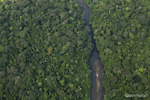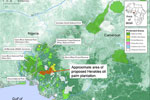
Aerial view of the Herakles concession in Cameroon. Taken in June 2013..
Herakles Farms, an American agribusiness company, has been ordered to pay $4.6 million by a court in Cameroon over alleged discrimination in its hiring practices, reports APA.
Herakles, which was recently awarded 20,000 hectares of land in southwestern Cameroon for oil palm plantations, allegedly dismissed Loxly Epie from his position as president of financial operations at Sithe Global Sustainable Oils Cameroon (SGSOC), the company’s local subsidiary. A judge in Limbe, Cameroon, ruled the dismissal was illegal, noting that Epie’s replacement — an Australian — had no experience in accounting or management.
It wasn’t immediately clear whether Herakles would contest the ruling.


Rainforest clearing for the oil palm plantations under development by Herakles in Cameroon. Photos taken in June 2013.
Herakles has faced strong criticism from environmentalists over its plans to convert large blocks of rainforests for plantations as well as its portrayal of the project as good for wildlife and climate. The company has had to scale-back its ambitions after failing to win a license for the full 73,000 hectares originally targeted for the project.
Herakles received other bad news last month when its founder and former chief executive, Bruce Wrobel, was found dead in an apparent suicide, according to The Wall Street Journal. He was 56.
Editor’s note: this story was amended Jan 9. APA stated “Blessed Okoye” was the dismissed employee, but court documents indicate that “Loxly Epie” is the plaintiff’s name.
Related articles
Controversial palm oil project approved in Cameroon rainforest

(11/26/2013) A controversial palm oil project set in the West African rainforest in Cameroon has won a three-year provisional lease to convert 20,000 hectares of land for plantations. The project, which is run by U.S.-based Herakles Farms, has been heavily opposed by environmental groups who say it will destroy blocks of wildlife-rich forest.
Controversial oil palm company now accused of illegal logging in Cameroon rainforest
(09/18/2013) Environmental group, Greenpeace, has accused Herakles Farms of illegal logging in Cameroon after the company has already been lambasted by scientists and conservationists for its plan to build a 70,000 hectare palm oil plantation in one of Africa’s most biodiverse rainforests. Herakles Farms has been under fire from green groups—both in Cameroon and abroad—for years over its oil palm plantation plans, including facing protests from locals who live in the forest to be cleared.
Endangered chimps and forest elephants found in rainforest to be logged for palm oil

(08/08/2013) A biological survey of forests slated for destruction for a palm oil project in Cameroon has uncovered 23 species of large mammals, including the world’s most endangered chimpanzee subspecies, the Nigeria-Cameroon chimpanzee (Pan troglodytes ellioti). The project in question, operated by U.S.-based company Herakles Farms, has come under stiff criticism both locally and abroad for threatening one of Africa’s most biologically rich forest lands and arguably undercutting local peoples’ access to traditional lands.
Controversial palm oil project concession in Cameroon is 89 percent ‘dense natural forest’

(02/21/2013) Satellite mapping and aerial surveys have revealed that a controversial palm oil concession in Cameroon is almost entirely covered by “dense natural forest,” according to a new report by Greenpeace. The activist group alleges that the concession, owned by Herakles Farms, is under 89 percent forest cover. The U.S.-based corporation intends to build a 70,000 hectare palm oil plantation in a region surrounded by four protected areas, including Korup National Park, but has faced stiff criticism from numerous environmental groups as well as conflict with locals.
Palm oil, poverty, and conservation collide in Cameroon

(09/13/2011) Industrial palm oil production is coming to Africa, its ancestral home. And like other places where expansion has occurred rapidly, the crop is spurring hope for economic development while generating controversy over its potential impacts. The world’s most productive oil seed has been a boon to southeast Asian economies, but the looming arrival of industrial plantations in Africa is raising fears that some of the same detriments that have plagued leading producers Malaysia and Indonesia—deforestation, greenhouse gas emissions, biodiversity loss, conflicts with local people, social displacement, and poor working conditions—could befall one of the world’s most destitute regions. While there is no question that oil palm is a highly lucrative crop that can contribute to economic development, there is also little doubt that conversion of native forests for plantations exacts a heavy toll on the environment. The apparent conflict seems to pit agroindustrial goliaths against greens, with communities falling somewhere in between. But Herakles, a New York-based investment firm planning to construct a 60,000-hectare plantation in the Central African country of Cameroon, says its approach will bridge this gap between economic development and the environment. Social and environmental campaigners are skeptical.







